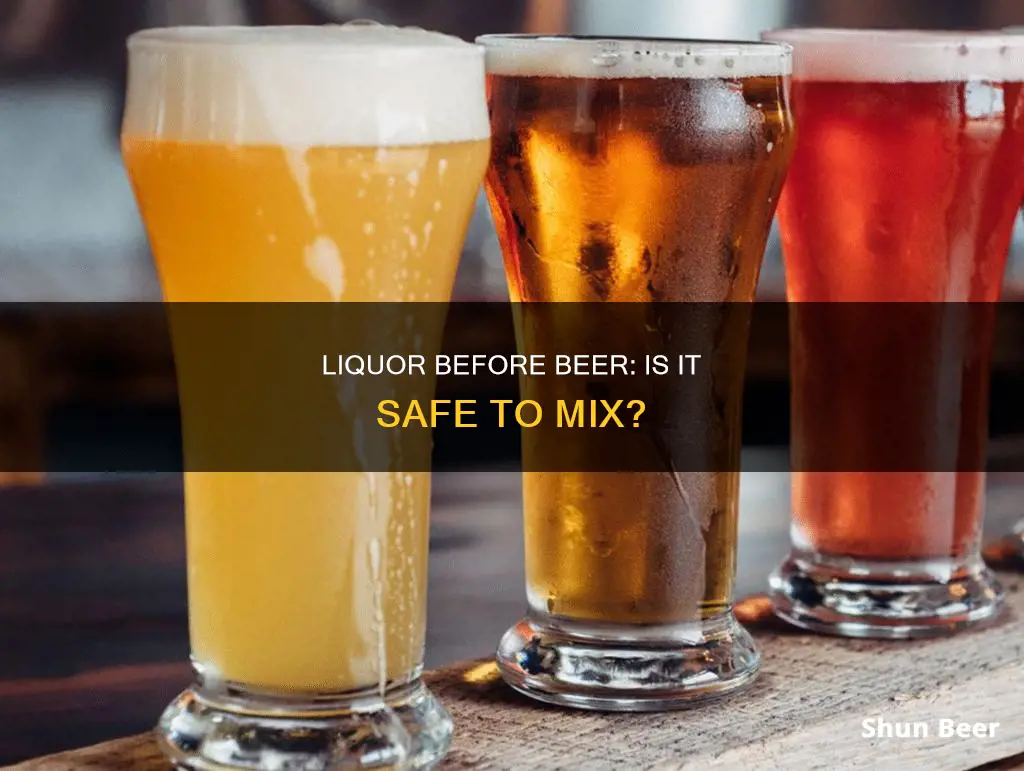
Beer before liquor, never been sicker; liquor before beer, you're in the clear is a well-known phrase used to justify the belief that drinking alcoholic beverages in a specific order can help you avoid a hangover. However, this saying is just a myth, and there is little scientific evidence to support it. The severity of a hangover depends on various factors, including the total amount of alcohol consumed, the rate of consumption, the presence of food in the stomach, and individual genetics. While drinking liquor before beer may not protect against a hangover, starting with liquor can lead to faster intoxication and potentially result in consuming larger amounts of alcohol. Ultimately, the key to avoiding a hangover lies in moderation, pacing, and responsible drinking practices rather than the order of drinks.
| Characteristics | Values |
|---|---|
| Is there any truth to the saying "beer before liquor, never been sicker; liquor before beer, you're in the clear"? | No, the order in which you consume your drinks is not likely to determine whether you will experience a hangover the next morning. |
| What makes you get sick from drinking? | When you consume any type of alcohol, your body breaks it down into a chemical called acetaldehyde, which is toxic and causes you to become sick from drinking too much alcohol. |
| Why does drinking beer before liquor get you drunk at a slower rate than liquor? | Beer has the lowest alcohol by volume compared to other popular types of alcohol like wine or hard liquor. Beer also has more volume than a shot of liquor or a cocktail. |
| What happens when you drink liquor before beer? | When you start the night with liquor, you'll feel intoxicated sooner since liquor has a higher alcohol by volume. |
| What happens when you drink beer and liquor in one cocktail? | It can leave you feeling ill, as it increases the amount of alcohol in your bloodstream. |
| How to prevent getting sick in the first place? | Drink in moderation, drink water between alcoholic drinks, and avoid drinking on an empty stomach. |
What You'll Learn

The amount of alcohol matters more than the type or order
The amount of alcohol consumed matters more than the type or order of drinks when it comes to hangovers and sickness. While the saying "beer before liquor, never been sicker; liquor before beer, you're in the clear" is widespread, it is not supported by scientific evidence. The idea that drinking beer before liquor will make you sicker is likely based on the misconception that carbonation irritates the stomach and causes faster absorption of liquor. However, research suggests that the order of drinks has little impact on hangover severity.
The amount of alcohol consumed is the key factor in determining whether you will experience a hangover or get sick. High blood alcohol levels are more likely to induce a hangover than low blood alcohol levels. Drinking in moderation is crucial to avoid these negative consequences. Additionally, drinking on an empty stomach can worsen the side effects of alcohol consumption and lead to faster intoxication. It is important to drink responsibly and be mindful of the amount of alcohol consumed, regardless of the type or order of drinks.
The belief that beer before liquor leads to sickness may also be influenced by the fact that beer has a lower alcohol content than liquor. Starting with beer may trick people into getting more drunk than intended, as they switch to liquor later in the evening. Liquor's high alcohol content can spike blood alcohol levels quickly, while beer's lower alcohol content leads to a slower rise in intoxication. However, this is not due to the order of drinks but rather the absolute volume and alcohol content of the beverages consumed.
The absorption rate of alcohol also plays a role in how it affects the body. A 2007 study found that diluted vodka was absorbed faster than vodka served neat. This suggests that even if the same amount of time is taken to consume straight liquor or a glass of wine, the wine may still lead to greater intoxication due to better absorption into the bloodstream. Therefore, it is not the order of drinks but the rate of absorption that influences the effects of alcohol.
A 2019 study further supported the idea that the type and order of drinks have little impact on hangover severity. The study found that neither the type of alcohol consumed nor the order in which it was consumed significantly affected the intensity of hangovers. This provides strong evidence that the amount of alcohol consumed is the primary factor influencing hangovers and sickness, rather than the type or order of drinks.
Beer and Fitness: Can You Have Both?
You may want to see also

Drinking beer first gets you drunk at a slower rate than liquor
There is a popular saying that goes, "Beer before liquor, never been sicker; liquor before beer, you're in the clear." This saying suggests that drinking beer before liquor will make you sick, while drinking liquor before beer will leave you feeling fine. However, experts say that there is no scientific basis to this claim, and the order of drinks does not determine whether you will experience a hangover.
Now, let's focus on the statement, "Drinking beer first gets you drunk at a slower rate than liquor." This statement is true. Beer typically has a lower alcohol content than liquor. A serving of beer, which is usually 12 ounces, contains about 5% alcohol, while a serving of liquor, which is around 1.5 ounces, can contain up to 40% alcohol. Therefore, when you drink beer, your blood alcohol content rises more gradually compared to when you consume liquor.
The slower increase in blood alcohol content when drinking beer first can have both advantages and disadvantages. On the one hand, starting with beer can help you pace yourself and may prevent you from getting too drunk too quickly. This is especially beneficial if you plan to drink for an extended period. By starting with a lower alcohol content drink like beer, you can better evaluate how you're feeling and make adjustments to your drinking pace as needed.
On the other hand, the slower intoxication rate of beer can be deceptive. If you start with beer and then switch to liquor, you might end up consuming more alcohol overall because you began with a slower-acting drink. This is because, when you're already mildly intoxicated from drinking beer, switching to liquor can cause you to drink the stronger beverage at a faster rate, leading to increased intoxication. In this case, you might find yourself getting drunker than intended.
In summary, drinking beer first does result in a slower rate of intoxication compared to starting with liquor. This can be beneficial for pacing yourself, but it can also trick you into consuming more alcohol than intended if you later switch to liquor. As always, it's important to drink responsibly, be mindful of your consumption, and prioritize your health and safety.
Old Beer: Is It Safe to Drink?
You may want to see also

Liquor has a far greater alcohol content than beer
The popular saying goes, "Beer before liquor, never been sicker; liquor before beer, you're in the clear." This saying suggests that drinking beer before liquor will make you sick, while drinking liquor before beer will leave you feeling fine. However, this is just a myth, and there is little scientific evidence to support it.
When you drink beer, your blood alcohol content rises more slowly than when you drink liquor because of the lower alcohol content. Beer also has more volume than a shot of liquor or a cocktail, so it takes longer to drink. This means that if you start with beer, you may get drunk at a slower rate, which can trick you into drinking more than intended.
On the other hand, if you start with liquor, you'll reach a higher level of intoxication sooner. However, some people feel that starting with liquor makes them pace themselves better, as they drink more slowly and may end up consuming less alcohol overall.
It's important to note that the order in which you consume your drinks is not the main factor in determining whether you will experience a hangover or get sick. The amount of alcohol you drink, the speed of consumption, whether you ate beforehand, and other factors play a more significant role in how you will feel.
In conclusion, while the saying "liquor before beer, you're in the clear" may have some psychological basis, it is not a guarantee. Drinking any type of alcohol in excess or too quickly can lead to negative consequences, regardless of the order in which you consume your drinks.
Beer and Ulcerative Colitis: What You Need to Know
You may want to see also

Beer takes longer to drink than a cocktail or shot
It's a common saying that "beer before liquor makes you sicker", but is there any truth to it? Well, it turns out that the order in which you drink beer and liquor doesn't really matter when it comes to how sick you get. What matters more is the amount of alcohol you consume and the rate at which you're drinking it.
Now, here's where the saying might have come from: beer takes longer to drink than a cocktail or a shot. A beer tends to have more volume than a cocktail or a shot, so it takes longer to finish. This means that you're consuming alcohol at a slower rate when you're drinking beer compared to when you're drinking cocktails or shots.
Let's look at an example: a Manhattan cocktail has an alcohol by volume (ABV) of around 28%, which is lower than straight whiskey at 40% ABV. However, the amount of alcohol consumed per drink is different. A Manhattan cocktail has around 2.5 times more volume than a shot, so you could drink 2.5 Manhattans in the time it takes to drink one bottle of beer. This means that, by drinking beer, you're giving yourself a lower alcohol consumption rate per minute compared to drinking cocktails or shots.
So, if you're planning on drinking cocktails or shots followed by beer, or vice versa, it's generally recommended to start with the drinks that you'll consume faster. That way, you give your body a lower alcohol consumption rate as you get more intoxicated throughout the night. Starting with the drinks that you'll consume slower might trick you into getting more drunk than you intended.
However, it's important to remember that the order of drinks doesn't guarantee you'll avoid a hangover. The amount of alcohol you consume, the rate at which you drink, whether you ate beforehand, and other factors play a bigger role in how you feel during and after drinking.
Beer and Food Poisoning: Is It Safe to Drink?
You may want to see also

The order of drinks may be a problem when drinking faster when inebriated
The order in which you consume your drinks is unlikely to influence whether you experience a hangover or get sick. It is a common belief that drinking beer before liquor can make you sicker, and there are several theories as to why this might be the case. One theory suggests that starting with beer gets you drunk at a slower rate than liquor, tricking you into drinking more than you intended. Another theory suggests that liquor's high alcohol content is more likely to spike your blood alcohol levels in a short period of time compared to beer. Therefore, finishing the night with liquor after drinking beer can quickly push your blood alcohol content over the edge, contributing to a hangover.
However, despite these theories, the total amount of alcohol you consume is more important than the type of drink or the order in which you consume them. Alcohol begins to be absorbed into your bloodstream as soon as it reaches your stomach, so all the alcohol you drank the night before will have been absorbed before any hangover effects kick in. As long as the total amount of alcohol consumed remains the same, drinking liquor before beer does not protect against a hangover any more than drinking beer before liquor.
That being said, the order of drinks may be a problem when drinking faster when inebriated. Liquor has a far greater alcohol content than beer, so if you start with beer and then switch to liquor, you could theoretically consume more alcohol in less time, leading to increased intoxication and sickness. On the other hand, if you drink liquor first and therefore more slowly, and then switch to beer, you will be consuming less alcohol overall, and you will be less likely to get sick.
It is important to note that drinking in moderation and pacing yourself is key to avoiding negative consequences such as hangovers and sickness. Additionally, factors such as eating before drinking, drinking water, and avoiding mixing alcohol with certain substances like energy drinks or pain relievers can also help reduce the severity of hangovers and negative side effects.
Beer and Vinegar: A Safe Mix?
You may want to see also
Frequently asked questions
No, this is just a myth. The amount of alcohol you drink matters more than the type or the order you drink it in.
No, the order in which you consume your drinks is not likely to determine whether you will experience a hangover the next morning.
The amount of alcohol you drink, whether you ate, how frequently you drink, genetics, congeners, and smoking.
Drinking in moderation, not drinking on an empty stomach, not smoking, and limiting how much and how often you drink alcohol are all ways to avoid a hangover.







